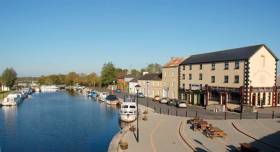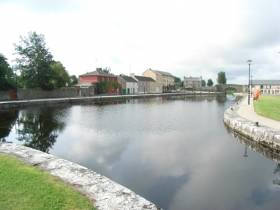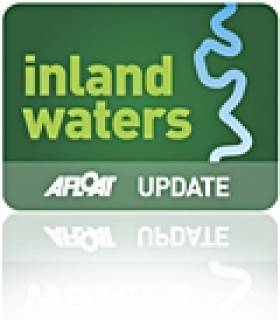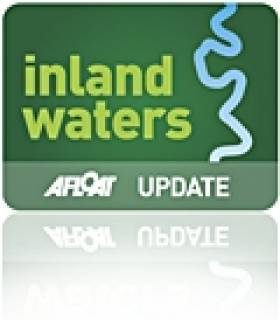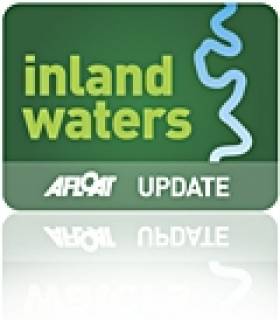Displaying items by tag: Richmond Harbour
Royal Canal: Lock 46 Closed for Week Due to Emergency Repairs
Waterways Ireland advises masters and owners of vessels on the Royal Canal that the 46th Lock is closed as of today (Friday 29 April) for one week in order to maintain water levels in Richmond Harbour due to emergency repair works at the 45th Lock.
Waterways Ireland has launched a request for tender for the development of a visitor and tourism plan for the Clondra/Richmond Harbour and Tarmonbarry area at the western end of the Royal Canal.
According to the RFT, the intended plan “will chart and identify the recreational and tourism interventions required to boost tourism, recreation and economic regeneration in the area”.
Among its objectives are “to take an integrated development approach to conserve, develop and promote [the area] as a significant recreation/tourism destination in the centre of Ireland”, and “to set out a clear, realistic and achievable tourism vision…over a 10-year period”.
In addition, any plan “must be compatible with the environmental designation and zoning” of the localities covered on this part of the inland waterway.
A particular focus for Waterways Ireland will be to “protect and restore one of our heritage assets” — namely the old lock keeper’s house at Lock 46, which dates from the early 19th century.
The deadline for receipt of tender applications is 3pm on Thursday 13 January 2022. More details can be found on the eTenders website HERE.
Royal Canal Breached at Richmond Harbour
Waterways Ireland advises masters of vessels on the Royal Canal that a breach in the canal has occurred in the vicinity of Richmond Harbour.
A significant reduction in water levels has occurred on the level between Locks 45 and 46 on the inland waterway.
Repair works commenced today, Monday 18 October, but there will be no access to Richmond Harbour from the Camlin River or from the eastern side through Lock 45 until further notice.
Masters and owners of boats moored in Richmond Harbour are advised to check on their boat regularly as water levels stabilise and rise again. Waterways Ireland says further updates will be provided in due course.
#InlandWaters - Waterways Ireland advises masters and owners of vessels on the Royal Canal at the Clondra, Co Longford end that:
- Non-permitted vessels, as per Article 6(8) of the Canal Act 1986 (Bye-Laws) 1988
- Non-attended and apparently abandoned vessels (Article 6(8))
- Doubled moored and causing obstruction (ie sunk) (Article 27 (3))
- Vessels deemed to be/likely to cause a hazard to navigation (Article 33(3))
may be removed from the Coolnahay and Richmond Harbour areas, east of the 45th Lock, within two weeks of this notice, posted Tuesday 3 April 2018.
Removed vessels may then be subsequently disposed of in accordance with Article 34(2).
Classes of vessels mentioned above will be stickered, given suitable access, and then removed from the waterway as operationally convenient in order to clear berths for visiting boats and the navigation for cruising vessels.
Clondra Hosts Canoeing Club Championships Next Month
#Canoeing - Richmond Harbour on the Royal Canal in Clondra, Co Longford will be the site of the Canoeing Ireland Club Championships over the weekend of 16-17 April.
As the Longford Leader reports, the event coincides with the second annual Longford Blueway Festival taking place in the town and surrounds.
Up to 500 competitors and their supporters are expected in Clondra for the national canoeing contest which joins a number of events scheduled for the weekend, including cycles and walks of the 10km Camlin Loop of the Shannon Blueway that was launched last year, as previously reported on Afloat.ie.
There will also be public 'taster sessions' on the water for those curious about canoeing whether for sport or recreation. Details are available on the Canoeing Ireland website.
The Longford Leader has more on the story HERE.
Fallen Tree Blocks Royal Canal's Richmond Harbour
MARINE NOTICE
No 4 of 2014
Shannon Navigation & Royal Canal
Clondara / Richmond Harbour
Waterways Ireland wishes to advise masters that a large tree has fallen across the navigation and is presently obstructing the entrance to Richmond Harbour and the Camlin jetties.
A further marine notice will issue when the navigation has been cleared.
Waterways Ireland Celebrates Restoration of the Royal Canal
Celebrations for Royal Canal Reopening
Waterways Ireland in conjunction with a working committee will mark the completion of the main line of the Royal Canal on the inland waterways with an event that will take place in Richmond Harbour, Clondra, Co. Longford on the 1st October as part of a weekend of festivities. This event is the culmination of not only 36 years of campaigning by the Royal Canal Amenity Group (RCAG) but a summer of waterside events moving East to West; boaters and waterside communities have been celebrating the reawakening of the Royal Canal each weekend leading up to the main event.
The formal event will take place on October 1st at 2pm, with a flotilla of boats arriving into Richmond Harbour. The flotilla will include boats from each branch of the RCAG as well as the Heritage Boat Association, Inland Waterways Association of Ireland, the supporters of the Canal d'Nivernais, representatives of the Wilderness Boats. The flotilla will be lead by Royal Canal Barge no 3 (also known as the Killucan Barge). The formal event will be followed by a weekend of celebrations organised by the Clondra Branch of the RCAG and supported by Waterways Ireland. The weekend festivities are open to all.
The Royal Canal is a highly significant and historic public amenity. 145.6km long, the Royal Canal stretches from Dublin to the Shannon passing through Dublin, Kildare, Meath, Westmeath and Longford. 1.2 million people live within this catchment making the Royal Canal one of the largest public amenities on the island.


























